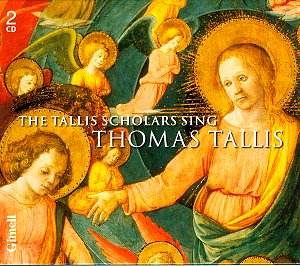These are some of the
first Tallis recordings. They were made
in the early 1980s by Peter Phillips’
ground- breaking ‘Tallis Scholars’ and
originally issued on LP. It is more
than good to have them at last gathered
together in this beautiful presentation
double CD format and slip case.
The style and language
of the works are mixed up between the
two CDs so that each offers a varied
programme counter-pointing material
from throughout Tallis’s long and fruitful
career in music. It is music that one
admires increasingly as the years go
on.
Since the 1980s Tallis
has been recorded regularly. There is
now considerably more competition for
the Scholars than was the case when
the LPs were first issued. At the time
only Andrew Parrot’s two EMI discs were
serious contenders.
Of these recordings
it was said at the time that one of,
perhaps the only one of, Peter Phillips’
problems was his tendency to drive the
music too relentlessly, to set an unvaried
tactus and to stick with it come what
may. This is more true of some of the
later recordings; for example the John
Shepherd and the William Cornysh discs.
Curiously, I also feel it is true when
the ladies are singing in the stratospherically
high large-scale motets. By contrast
the pieces in English for men’s voices
alone flow at an idyllically steady
and ideal tempo. There is though an
element of the hurried trait in these
early recordings, for example in the
‘Sancte Deus’ which quite rightly moves
on in its middle section. This pacing
could surely have relented in the final
gloriously flowering ‘A-men’. This performance
is also spoilt by having too strong
a top part and by rather muddy lower
voices. This is also a criticism I would
level at the recording of ‘Salve intemerata’
on CD2.
The recent CDs by Alistair
Dixon and Chapelle du Roi, issued
as part of their ongoing complete Tallis
series for ‘Signum’, avoid both these
criticisms. Dixon’s speeds can be leisurely
but they are also poised. His ‘Sancte
Deus’ is a good example at well over
half a minute slower. Even the short
simpler English anthems like ‘If ye
love me’ come as even more relaxed and
spiritual in Dixon’s versions.
When listening to the
‘Tallis Scholars’ you are not hearing
the music as Tallis heard it. That is
also true of Alistair Dixon’s versions
also with women’s voices on the top
part. The latter however use only a
handful of sopranos whereas Phillips
goes in for the bright rich sound of
several strong female voices.
The famous setting
of ‘The Lamentations’ comes over very
well with the Tallis Scholars. They
opt, because they have women on the
top part, for the higher key favoured
by Edmund Fellows in his now quite ancient
edition. That said, we are told that
Sally Dunkley prepared the present edition
of this work and David Skinner and John
Milsom have ‘papered’ the others. ‘The
Lamentations’ has the key signature
of three sharps, giving a modern day
key of A major/F#minor. This also gives
a high tenor part and a wonderfully
rich high bass - much enjoyed by these
singers. The performance gradually evolves
towards its glorious dénouement
and does so quite naturally and very
movingly.
In his accompanying
essay Peter Phillips writes of the four
periods in Tallis’s lengthy composing
career and how they equate to the historical
events which surrounded him.
They can be seen as:
(1) the Henrican works, the pieces written
mostly before 1545, in some cases apprentice
pieces like the rather dull ‘Magnificat
for 4 voices’ and ‘Ave, Dei patris filia’
which shows the influence of the Eton
Choirbook and composers like Fayrfax
and Taverner. (2) next came the severe
Protestantism of Edward VI’s reign.
Tallis, as Peter Phillips, remarks did
not sulk but got on with life writing
some of his most beautiful and memorable
anthems like ‘Hear the Voice and prayer’
and ‘A new Commandment’. (3) then came
the final flowering, the years of Elizabeth
I, when, alongside William Byrd, the
two composers were free to explore almost
any style sometimes choosing Latin but
infusing it with a clarity and directness
lacking in the earlier Latin works.
Now often performed pieces like ‘In
manus tuas’ and the expressive ‘O sacrum
convivium’ represent this late flowering.
To sum up. If you do
not own the Scholars’ Tallis discs then
you simply must have these. You should
also investigate the Signum discs mentioned
above, and indeed the Hilliard Ensemble’s
recordings. Listening to the Scholars
now sends me nostalgically into a late
1980s time-warp, of Oxford colleges
where they were first heard and dark
winter Cathedral concerts, of hard seats
and glorious music resounding in the
lofty clerestory. This was a way which
was new to most of us, exciting and
stimulating. All of these emotions are
re-captured on these timely re-issues.
Full texts are given
and Peter Phillips’ thoughtful essay
is translated into French and German.
Gary Higginson


